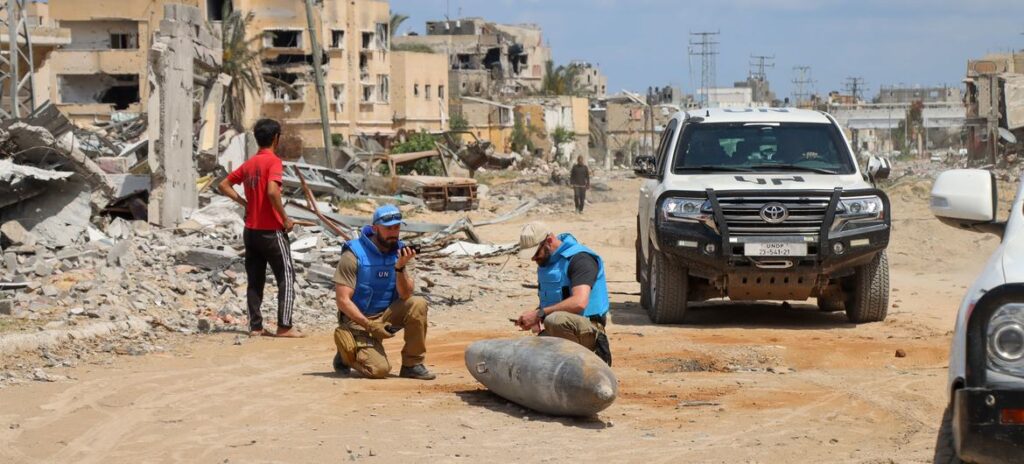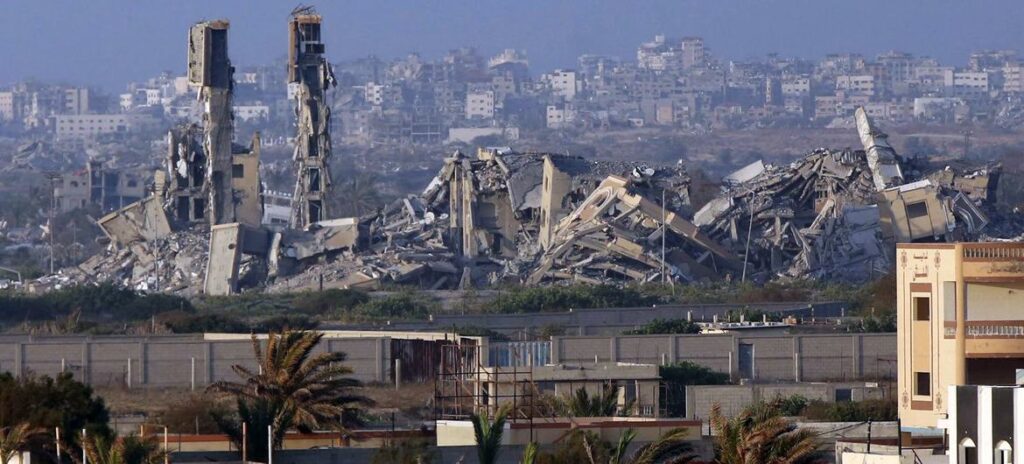Gaza ‘Split in Two’ as Civilians, Humanitarians Reset Lives, Aid Efforts
UNITED NATIONS, 8 Jul 2024
UN News - TRANSCEND Media Service
4 Jul 2024 – The Gaza Strip is virtually “split in two”, with blockades not only restricting the movement of displaced people seeking shelter, but also aid workers trying to assist civilians in desperate need, a UN relief official said yesterday.
Speaking via video link from Jerusalem, Andrea De Domenico, head of the UN Office for the Coordination of Humanitarian Affairs (OCHA) in the occupied Palestinian territory (OPT), said people have been forced to “completely reset their lives over and over again.”
“People, in the last nine months, have been moved around like ‘pawns in a board game’ – forced from one location to the next, to the next [and] to the next, irrespective of our ability of support them and irrespective of the availability of services wherever they land,” he said.
The Gaza Strip is virtually “split in two”, with blockades not only restricting the movement of displaced people seeking shelter, but also of aid workers trying to assist civilians in desperate need, the head of @OCHAopt said on Wednesday
Read more ⤵️https://t.co/kiDT7G6gWR pic.twitter.com/lfwjTowynA
— UN News (@UN_News_Centre) July 3, 2024
Humanitarians, meanwhile, also have to relocate their base of operations and evacuate from one location to another, as the military operations shift focus.
“The military operations are pushing [us] again and flipping the table,” he said.
He added that as discussions were being held with all stakeholders, including Israeli authorities on bringing aid supplies into Gaza and distributing it, the latest evacuation orders in Khan Younis have “wiped” out all the hard work.
Life beyond imagination
According to estimates, 1.9 million people in the war-ravaged enclave are internally displaced – including people displaced up to nine or 10 times.
“They have been forced to move because of the patterns of the war, heavy fighting that has impacted them whenever they took the risk to stay, where [they had] houses or where [they had] tents, huts and makeshift shelters,” he added.
Mr. De Domenico noted that humanitarians have to restart their efforts “over and over again”, while the displaced must figure out where they can find food, water, and medical help, and reacquaint themselves with their neighbours if they do not have families.
“And that has stripped apart – again and again and again – and people have to reinvent their ability to cope with condition of lives that are beyond imaginable,” he said.
He also emphasized that as the war goes on, it continues to generate more pain, suffering and humanitarian needs. However, humanitarians are “struggling to deliver.”
“We are there to stay and to deliver, to help the people but delivering for us is a daily struggle … literally we have to make gigantic efforts to sustain some lifeline of our services.”

A UN team inspects an unexploded bomb lying on a main road in Khan Younis, Gaza.
© UNOCHA/Themba Linden
‘Enough of this war’
The OCHA official outlined the challenges for aid workers, explaining that before the war, the humanitarian hub was in Gaza City, in the north.
“Then in the night between 11 and 12 October, in the middle of the night, Israeli authorities ordered us to abandon those facilities and move south … we had to comply … to protect the lives of our staff,” he said.
“We left with a feeling of guilt because we knew that we were leaving behind civilians and since then we have been quite determined to not being pushed every time by the conditions to move, unless really the safety comes into [question].”
“We really need to draw a line … enough of this war that keeps on tearing apart the life of people.”
‘Nowhere and no one is safe’
Mr. De Domenico reiterated that “nowhere and no one is safe” in Gaza, neither the civilians nor humanitarians.
So far, at least 274 aid workers and volunteers have been killed – many while they were working, others at home with their families.
“[Humanitarians] risk their life every day and there are [few, if any] humanitarian installations that have been spared when the frontline moves … despite our efforts to notify the locations, the reality … is frequently those places are hit,” he added.
Tags: Anglo America, Colonialism, Crimes against Humanity, Ecocide, Ethnic Cleansing, Famine, Gaza, Genocide, Genocide Convention, Hamas, Hunger, International Court of Justice ICJ, International Criminal Court ICC, Israel, Israeli Apartheid, Israeli occupation, Massacre, Palestine, Protests, Rafah, Students Anti-Genocide Gaza, USA, United Nations, War crimes, West Bank, Zionism
DISCLAIMER: The statements, views and opinions expressed in pieces republished here are solely those of the authors and do not necessarily represent those of TMS. In accordance with title 17 U.S.C. section 107, this material is distributed without profit to those who have expressed a prior interest in receiving the included information for research and educational purposes. TMS has no affiliation whatsoever with the originator of this article nor is TMS endorsed or sponsored by the originator. “GO TO ORIGINAL” links are provided as a convenience to our readers and allow for verification of authenticity. However, as originating pages are often updated by their originating host sites, the versions posted may not match the versions our readers view when clicking the “GO TO ORIGINAL” links. This site contains copyrighted material the use of which has not always been specifically authorized by the copyright owner. We are making such material available in our efforts to advance understanding of environmental, political, human rights, economic, democracy, scientific, and social justice issues, etc. We believe this constitutes a ‘fair use’ of any such copyrighted material as provided for in section 107 of the US Copyright Law. In accordance with Title 17 U.S.C. Section 107, the material on this site is distributed without profit to those who have expressed a prior interest in receiving the included information for research and educational purposes. For more information go to: http://www.law.cornell.edu/uscode/17/107.shtml. If you wish to use copyrighted material from this site for purposes of your own that go beyond ‘fair use’, you must obtain permission from the copyright owner.
